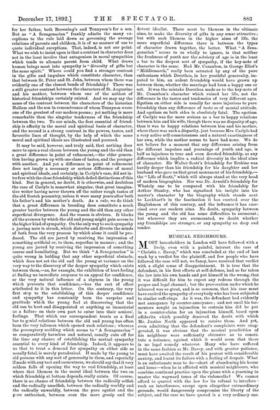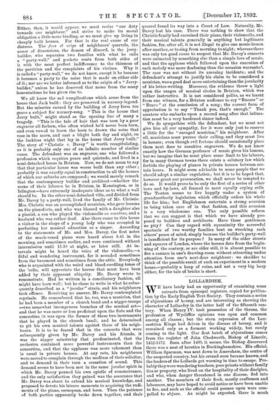MUSICAL NEIGHBOURS.
MOST householders in London will have followed with a lively, even with a painful, interest the case of " Christie v. Davey," which was concluded at the end of last week by a verdict for the plaintiff, and few people who have followed the case will not, we fancy, have received that verdict with a slight sense of disappointment. It is true that the defendant, in his first efforts at self-defence, had so far taken the law into his own hands and put himself in the wrong, that it was difficult for him to expect any redress through the proper and legal channel ; but the provocation under which he laboured was so great, and is so common, that his case must have excited the sympathy of everybody who has been subjected to similar sufferings. As it was, the defendant had evidently met annoyance by counter-annoyance ; and not until his tor- mentors sought an injunction to restrain him did he put in a counter-claim for an injunction himself, based upon affidavits which possibly deserved the doubt with which Mr. Justice North appeared to receive them. And yet, even admitting that the defendant's complaints were exag- gerated, it was obvious that the musical proclivities of his neighbour were sufficiently obtrusive as to consti- tute a nuisance, against which it would seem that there is no legal remedy whatever. Many who have suffered in the same fashion as Mr. Davey, and with greater patience, must have awaited the result of his protest with considerable anxiety, and learnt its failure with a feeling of despair. What is an unfortunate man to do—short of abandoning his house and home—when he is afflicted with musical neighbours, who combine continual practice upon the piano with a yearning to master the wayward tones of the violoncello P We cannot afford to quarrel with the law for its refusal to interfere : such an interference, except upon altogether extraordinary grounds, would dangerously compromise the liberty of the subject, and the case we have quoted is a very ordinary one.
Either, then, it would appear, we must revise "our duty towards our neighbour," and strive to make its moral obligation a little more binding, or we must give up living in cheaply built houses. For that is the real cause of our distress. The foes et origo of neighbours' quarrels, the sower of dissensions, the demon of discord, is the jerry- builder, who separates two families with what he calls a " party-wall," and pockets rents from both sides of it with the most perfect indifference to the thinness of the partition and the complaints of his victims. Why it is called a " party-wall," we do not know, except it be because it becomes a party to the noise that is made on either side of it ; nor are we better informed as to the origin of a " Jerry- builder," unless he has deserved that name from the many lamentations he has given rise to.
We all know the sad complications which arose from the house that Jack built : they are preserved in nursery-legend. But the miseries caused by the building of Jerry form too grave a subject for nursery-song. " This is the house that Jerry built," might stand as the opening line of many a tragedy. "This is the tale of hair that was torn by a poor engraver all forlorn, who often wished he'd never been born, and even vowed to learn the horn to drown the noise that rose in the morn, and cast a blight both day and night, on the luckless wight that lay in the house that Jerry built." The story of "Christie v. Davey" is worth recapitulating, as it is probably only one of an infinite number of similar cases. The defendant was an engraver, one who followed a profession which requires peace and quietude, and lived in a semi-detached house in Brixton. Now, we do not mean to say that that particular house was worse built than any other ; probably it was exactly equal in construction to all the houses of which our suburbs are composed ; we would merely remark that the contemporary builder and architect—whether the scene of their labours be in Brixton, in Kensington, or in Islington—have extremely inadequate ideas as to what a wall should be. In the other semi-detached villa, and divided from Mr. Davey by a party-wall, lived the family of Mr. Christie. Mrs. Christie was an accomplished musician, who gave lessons on the pianoforte, and who was blessed with a daughter also a pianist, a son who played the violoncello en amateur, and a husband who was rather deaf. Also there came to this house a visitor in the shape of a young lady who was occupied in perfecting her musical education as a singer. According to the statements of Mr. and Mrs. Davey, the first notes of the much-vexed piano were heard about 8.45 in the morning, and sometimes earlier, and were continued without intermission until 11.30 at night, or later still. At in- tervals might be heard the voice of the violoncello,—a fitful and wandering instrument, for it sounded sometimes from the basement and sometimes from the attic. Everybody who is acquainted with the weird and blood-curdling tones of the 'cello, will appreciate the horror that must have been added by their apparent ubiquity. Mr. Davey wrote to remonstrate. Had be written in a conciliatory fashion, all might have been well ; but he chose to write in what he subse- quently described as a " jocular " strain, and his neighbours took offence. Receiving no answer, Mr. Davey contemplated reprisals. He remembered that he, too, was a musician, that he had been a member of a church band and a nigger-troupe —two somewhat incongruous branches of the musical art— and that he was more or less proficient upon the flute and the concertina (it was upon the former of these two instruments that he played in the church band), and he determined to pit his own musical talents against those of his neigh- bours. It is to be feared that in the concerts that were subsequently given by Mr. Davey and his friends, it was the nigger minstrelsy that predominated, that the orchestra contained more powerful instruments than the concertina, and that the applause was more vehement than is usual in private houses. At any rate, his neighbours were moved to complain through the medium of their solicitor, and to demand in their turn a cessation of sound. This demand seems to have been met in the same jocular spirit in which Mr. Davey penned his own epistle of remonstrance, and the only satisfaction they gained was the assurance that Mr. Davey was about to extend his musical knowledge, and proposed to devote his leisure moments to acquiring the rudi- ments of the piano, cornopean, and horn. Then the patience of both parties apparently broke down together, and their quarrel found its way into a Court of Law. Naturally, Mr. Davey lost his case. There was nothing to show that the Christie family had exercised their piano, their violoncello, and their musical talents generally in anything but legitimate fashion, for, after all, it is not illegal to give one music-lesson after another, or to sing from morning to night; whereas there was only too good cause to suspect that Mr. Davey's concerts were animated by something else than a simple love of music, and that the applause which followed upon the execution of each melody was more deafening than the occasion warranted. The case was not without its amusing incidents ; and the defendant's attempt to justify his claim to be considered a musician, was a good deal more entertaining than the jocularity of his letter-writing. Moreover, the evidence threw a light upon the usages of musical circles in Brixton, which was rather instructive. It is not considered polite, as we learnt from one witness, for a Brixton audience to cry "Encore" or " Bravo " at the conclusion of a song ; the correct form of approbation is to say " Thank you, that's enough." The amateur who embarks upon a second song after that intima- tion must be a very hardened sinner indeed.
We do sympathise with the defendant, but we must not give him all our sympathy, for it were only just to reserve a little for the "enraged musician," his neighbour. After all, musicians must pursue their calling, and they must live in houses; even though evil fortune should occasionally place them next door to sensitive engravers. We do not know exactly how the German professor of music gives his lessons, but we imagine that he must place some limit to his labours, for in many German towns there exists a salutary law which forbids the playing of pianos in private houses between cer- tain hours. It might seem advisable to some people that we should adopt a similar regulation ; but it is to be hoped that, however great our provocation, we shall never be tempted to do so. It would prove to be only the first of a series of other laws and by-laws, all framed to meet equally crying evils The Teuton seems to live happily under a system of grandmotherly legislation which officially orders his whole life for him ; but Englishmen entertain a strong aversion to being taken care of in that fashion, and this aversion is a very wholesome one. The only possible reform that we can suggest is that which we have already pro- posed to builders and architects. Have these gentlemen no pity ? Can they regard with equanimity the sorrowful spectacle of two worthy families bent on wrecking each others' peace of mind, simply because the builder's party-wall is insufficient for its purpose ? In many of the older streets and squares of London, where the houses date from the begin- ning of the century, or are older still, it is almost possible to fire a cannon in one's drawing-room without attracting undue attention from one's next-door neighbour : we shudder to think of the possible result of such an experiment in a modern house,—probably a heap of ruins, and not a very big heap either, for the tale of bricks is short.







































 Previous page
Previous page